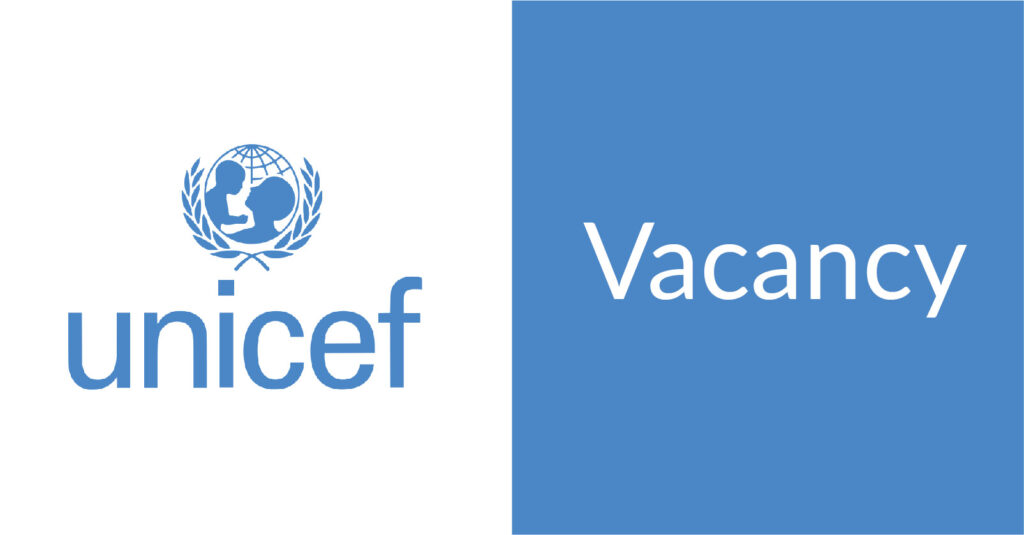
UNICEF Job Vacancies in Africa: Opportunities, Requirements, and Application Process.
Latest UNICEF job vacancies in Africa. When people think about global humanitarian organizations making a difference in the lives of children and communities, UNICEF often comes to mind. The United Nations International Children’s Emergency Fund (UNICEF) has been operating for decades across the globe, and Africa remains one of its most active regions. With numerous programs tackling child health, education, nutrition, protection, and emergency relief, UNICEF regularly announces job vacancies in different African countries.
If you are a graduate, a professional, or someone passionate about humanitarian service, you may be asking: How can I find UNICEF job vacancies in Africa? What qualifications are needed? What does the recruitment process involve? This guide will answer those questions and provide a detailed overview of everything you need to know.
Why Work with UNICEF in Africa?
UNICEF operates in more than 190 countries, but Africa stands out due to the scale of humanitarian challenges and opportunities. From tackling malnutrition in the Sahel to providing education in rural East Africa, UNICEF’s mission in Africa is crucial.
Here are some reasons why working with UNICEF in Africa can be rewarding:
- Impactful Work – Every role contributes directly or indirectly to improving the lives of children. Whether you work in health, communication, logistics, or administration, your input matters.
- Global Recognition – UNICEF is one of the most respected organizations worldwide, and working here enhances your career profile.
- Diversity of Roles – From field officers to senior management, there is a wide range of opportunities.
- Professional Growth – UNICEF invests in training and career development for staff.
- Networking Opportunities – Staff often collaborate with other UN agencies, governments, and NGOs, providing rich professional exposure.
Types of UNICEF Job Vacancies in Africa
UNICEF offers different categories of employment depending on contract type, job function, and duration. Here are the main categories:
1. International Professional (IP) Staff
These are positions for experienced professionals recruited internationally. They often require advanced degrees and several years of relevant experience. Roles may include:
- Nutrition Specialist
- Child Protection Officer
- Education Program Manager
- Health Officer
2. National Officer (NO) Staff
These positions are for citizens of the host country. They allow local professionals to contribute to UNICEF’s mission while building their careers. Examples include:
- National Communication Officer
- Monitoring and Evaluation Specialist
- Human Resources Officer
3. General Service (GS) Staff
These positions support administrative and operational work. They usually require fewer qualifications compared to professional roles. Examples include:
- Administrative Assistant
- IT Assistant
- Driver
4. Consultancies and Short-Term Contracts
UNICEF often hires consultants or temporary staff for specific projects. This is common in emergency responses or when specialized expertise is required.
5. Internships
Internships are available for students or recent graduates. These provide valuable experience in international development and humanitarian work.
UNICEF Job Vacancies in Africa by Sector
UNICEF vacancies in Africa are not limited to one area. Here are the main sectors where jobs are advertised:
- Health and Nutrition: Doctors, nurses, nutritionists, and public health professionals.
- Education: Teachers, curriculum developers, and education specialists.
- Child Protection: Social workers, psychologists, protection specialists.
- Water, Sanitation, and Hygiene (WASH): Engineers, sanitation experts.
- Emergency Response: Field coordinators, logistics officers.
- Administration and Operations: HR, finance, procurement, IT.
- Communication and Advocacy: Media officers, campaign managers, digital specialists.
- Monitoring and Evaluation: Data analysts, research officers.
UNICEF Recruitment Process in Africa
Applying for a UNICEF job vacancy in Africa involves several steps. It is important to understand this process to increase your chances of success.
Step 1: Job Search
All UNICEF vacancies are posted on the official careers portal: https://jobs.unicef.org. Candidates can filter vacancies by region, job category, and contract type.
Step 2: Application Submission
Applicants are required to submit an online application through the portal. This usually involves:
- Creating a personal profile.
- Uploading a CV and cover letter.
- Answering specific job-related questions.
Step 3: Screening and Shortlisting
Recruiters review applications and shortlist candidates who meet the requirements.
Step 4: Assessment
Shortlisted applicants may be invited for written assessments, technical evaluations, or case studies.
Step 5: Interview
Interviews are typically competency-based. Candidates are expected to demonstrate knowledge, experience, and skills relevant to the role.
Step 6: Reference and Background Checks
Before final selection, UNICEF conducts thorough checks to verify employment history, education, and references.
Step 7: Offer and Onboarding
Successful candidates receive an offer and undergo onboarding.
General Requirements for UNICEF Jobs in Africa
While requirements vary by role, here are the common qualifications and skills needed:
- Education:
- A bachelor’s or master’s degree in fields such as public health, education, social sciences, international relations, or business administration.
- Technical roles (e.g., engineers, medical staff) require relevant professional qualifications.
- Experience:
- Entry-level positions may require 2–3 years of experience.
- Mid-career and senior roles often demand 5–10+ years of experience.
- Skills:
- Strong communication and teamwork skills.
- Analytical and problem-solving ability.
- Proficiency in English or French (bilingual candidates are highly valued).
- Computer literacy (MS Office, statistical tools, or specialized software, depending on the role).
- Values:
- Commitment to UNICEF’s mission and values.
- Respect for diversity and cultural sensitivity.
- Integrity and professionalism.
UNICEF Job Vacancies in Specific African Countries
UNICEF Nigeria
Nigeria hosts one of UNICEF’s largest country offices in Africa, focusing on child protection, health, and education. Common vacancies include health officers, communication specialists, and monitoring experts.
UNICEF Kenya
Kenya is a regional hub, and job opportunities often involve program management, WASH, and emergency response.
UNICEF South Africa
South Africa focuses on education, HIV/AIDS prevention, and policy advocacy. Vacancies often require strong policy and research experience.
UNICEF Ethiopia
Ethiopia faces humanitarian challenges such as drought and displacement. UNICEF recruits field workers, nutrition specialists, and emergency coordinators.
UNICEF Democratic Republic of Congo (DRC)
The DRC requires child protection officers, emergency response coordinators, and logistics experts due to ongoing conflict situations.
Other countries with active UNICEF programs include Uganda, Sudan, Somalia, Tanzania, and Ghana.
How to Increase Your Chances of Getting a UNICEF Job in Africa
- Tailor Your Application – Customize your CV and cover letter for each vacancy. Use keywords from the job description.
- Highlight Relevant Experience – Even volunteer experience in community development or NGOs can be valuable.
- Learn Languages – Fluency in English, French, or Portuguese can open more doors.
- Gain Humanitarian Experience – Working with local NGOs, UN agencies, or volunteer programs helps.
- Stay Updated – Regularly check the official UNICEF job site and other UN career platforms.
Related content: Best Health NGO jobs in Africa
Frequently Asked Questions (FAQs) about UNICEF Job Vacancies in Africa
Q1: Does UNICEF recruit fresh graduates in Africa?
Yes, but opportunities are limited. Fresh graduates are encouraged to apply for internships, volunteer roles, and entry-level positions as national officers.
Q2: Is it possible to work with UNICEF without international experience?
Yes. National officer positions allow local professionals to contribute even without international experience.
Q3: What is the salary range for UNICEF jobs in Africa?
Salaries vary depending on position and country. International positions typically pay in US dollars, while national positions pay in local currency. Benefits may include health insurance, pension, and relocation allowances.
Q4: How competitive are UNICEF jobs in Africa?
Highly competitive. Thousands of applicants apply for limited positions. Standing out requires relevant skills, strong experience, and tailored applications.
Q5: Can I apply for multiple UNICEF jobs at once?
Yes, you can apply for several roles, but it is better to focus on positions where your qualifications closely match.
Q6: Are there volunteer opportunities with UNICEF in Africa?
Yes. UNICEF collaborates with the UN Volunteers (UNV) program, which enables volunteers to contribute to projects in African countries.
Final Thoughts
Latest UNICEF job vacancies in Africa provide an employment opportunity to make a lasting impact on the lives of children and communities. Whether you are a young graduate looking to start your career or an experienced professional seeking to apply your skills in meaningful ways, UNICEF offers a pathway to help Africa that has skills in various ways.
The key is to prepare, stay updated, and apply strategically to the latest UNICEF job vacancies in Africa. By tailoring your application, gaining relevant experience, and demonstrating a passion for UNICEF’s mission, you can increase your chances of joining this globally respected organization.
For more info, visit:
| Country | UNICEF Careers Page |
|---|---|
| Nigeria | UNICEF Nigeria Jobs |
| Kenya | UNICEF Kenya Jobs |
| South Africa | UNICEF South Africa Jobs |
| Ethiopia | UNICEF Ethiopia Jobs |
| Democratic Republic of Congo (DRC) | UNICEF DRC Jobs |
| Uganda | UNICEF Uganda Jobs |
| Sudan | UNICEF Sudan Jobs |
| Somalia | UNICEF Somalia Jobs |
| Tanzania | UNICEF Tanzania Jobs |
| Ghana | UNICEF Ghana Jobs |





